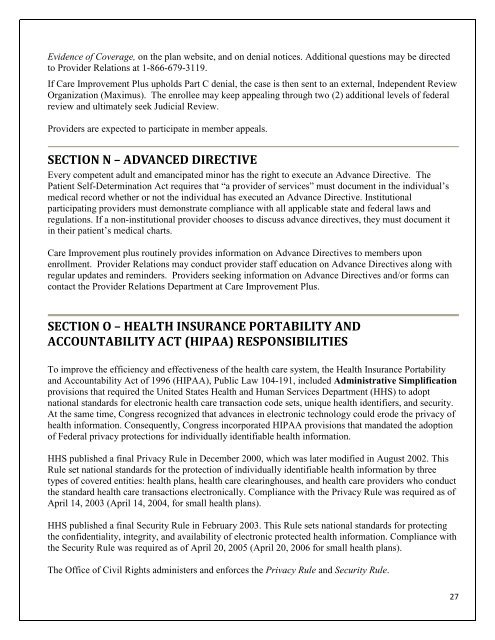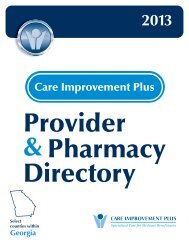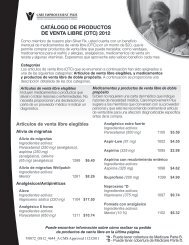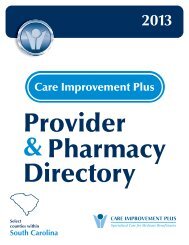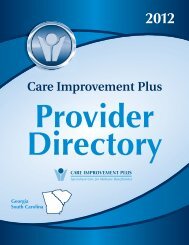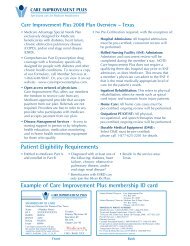Care Improvement Plus! This provider manual
Care Improvement Plus! This provider manual
Care Improvement Plus! This provider manual
You also want an ePaper? Increase the reach of your titles
YUMPU automatically turns print PDFs into web optimized ePapers that Google loves.
Evidence of Coverage, on the plan website, and on denial notices. Additional questions may be directed<br />
to Provider Relations at 1-866-679-3119.<br />
If <strong>Care</strong> <strong>Improvement</strong> <strong>Plus</strong> upholds Part C denial, the case is then sent to an external, Independent Review<br />
Organization (Maximus). The enrollee may keep appealing through two (2) additional levels of federal<br />
review and ultimately seek Judicial Review.<br />
Providers are expected to participate in member appeals.<br />
SECTION N – ADVANCED DIRECTIVE<br />
Every competent adult and emancipated minor has the right to execute an Advance Directive. The<br />
Patient Self-Determination Act requires that “a <strong>provider</strong> of services” must document in the individual’s<br />
medical record whether or not the individual has executed an Advance Directive. Institutional<br />
participating <strong>provider</strong>s must demonstrate compliance with all applicable state and federal laws and<br />
regulations. If a non-institutional <strong>provider</strong> chooses to discuss advance directives, they must document it<br />
in their patient’s medical charts.<br />
<strong>Care</strong> <strong>Improvement</strong> plus routinely provides information on Advance Directives to members upon<br />
enrollment. Provider Relations may conduct <strong>provider</strong> staff education on Advance Directives along with<br />
regular updates and reminders. Providers seeking information on Advance Directives and/or forms can<br />
contact the Provider Relations Department at <strong>Care</strong> <strong>Improvement</strong> <strong>Plus</strong>.<br />
SECTION O – HEALTH INSURANCE PORTABILITY AND<br />
ACCOUNTABILITY ACT (HIPAA) RESPONSIBILITIES<br />
To improve the efficiency and effectiveness of the health care system, the Health Insurance Portability<br />
and Accountability Act of 1996 (HIPAA), Public Law 104-191, included Administrative Simplification<br />
provisions that required the United States Health and Human Services Department (HHS) to adopt<br />
national standards for electronic health care transaction code sets, unique health identifiers, and security.<br />
At the same time, Congress recognized that advances in electronic technology could erode the privacy of<br />
health information. Consequently, Congress incorporated HIPAA provisions that mandated the adoption<br />
of Federal privacy protections for individually identifiable health information.<br />
HHS published a final Privacy Rule in December 2000, which was later modified in August 2002. <strong>This</strong><br />
Rule set national standards for the protection of individually identifiable health information by three<br />
types of covered entities: health plans, health care clearinghouses, and health care <strong>provider</strong>s who conduct<br />
the standard health care transactions electronically. Compliance with the Privacy Rule was required as of<br />
April 14, 2003 (April 14, 2004, for small health plans).<br />
HHS published a final Security Rule in February 2003. <strong>This</strong> Rule sets national standards for protecting<br />
the confidentiality, integrity, and availability of electronic protected health information. Compliance with<br />
the Security Rule was required as of April 20, 2005 (April 20, 2006 for small health plans).<br />
The Office of Civil Rights administers and enforces the Privacy Rule and Security Rule.<br />
27


